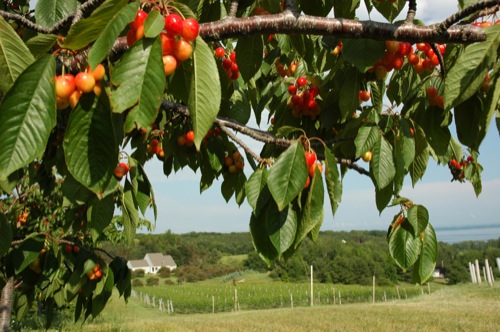
Cherries are a signature fruit in Traverse City, courtesy Traverse City CVB
The Midwest may be the nation’s breadbasket, but bread is always better with some wine and cheese. Throw in some cherries, ginseng and bison meat as well because agritourism opportunities in the Midwest are as bountiful and varied as the region’s harvests.
Des Moines, Iowa
The Wallace Centers of Iowa started growing organic fruits and vegetables at its 40-acre farm in 2000, well before “farm to table” was a culinary trend.
The center now offers farm-to-table meals at its two locations: the Wallace House in Des Moines and the Country Life Center in rural Orient, Iowa, about an hour southwest of Des Moines. The Country Life Center is the former farm and home of Henry C. Wallace, who was editor of his family’s newspaper, Wallaces’ Farmer, and was appointed secretary of agriculture in 1921 by President Warren G. Harding.
The nonprofit operates a Community Supported Agriculture program at the 40-acre farm. Only about 11 acres are tillable. Four acres are planted with fruits and three with vegetables, said Diane Weiland, CEO and program developer.
The Gathering Table restaurant at the Country Life Center first started offering lunches in 2006 and is now open for lunch and dinner on Fridays and for dinner the first Saturday of the month. Chef Katie Routh’s ever-changing menu features produce grown on the farm and locally raised meats, and a recent dinner included braised pork belly, fava bean raviolis and thyme pork jus parmesan polenta cake.
In May, the nonprofit also completed a renovation of the Wallace House kitchen and will offer Food for Thought dinners there on Thursday nights beginning in June.
But group meals can be arranged at any time at either the Country Life Center or the Wallace House, Weiland said, and the nonprofit’s other programs, such as historic teas and culinary classes, are also available for groups.
Visitors can also take walking tours of the farm or tour the Wallace House in Des Moines.
“Our diverse programming is all built all around food, which relates directly to the Wallace History,” Weiland said. “We love to have visitors; they are always surprised, and they always leave with a smile on their face.”
About 30 miles east of Des Moines is the home of Maytag Dairy Farms, which started making its famous blue cheese in 1941. The farm is still in the Maytag family, and every step of Maytag’s cheesemaking process is still done by hand today, including the packaging, said Katie Stien, national sales manager for the Greater Des Moines Convention and Visitors Bureau. Groups may take a small tour, which includes samples.
www.wallace.org | www.catchdesmoines.com
Traverse City, Michigan
Cherry season in Traverse City, Michigan, is short but sweet. And tart.
First come the tart cherries in July, followed by the sweet cherries, all during a two-week harvest window, said Mike Norton, spokesman for the Traverse City Convention and Visitors Bureau.
But during that brief time, visitors to the city have several options to visit orchards to pick their own cherries.
“There are people who make the pilgrimage up here every year to pick a few gallons of cherries because they just don’t think it tastes the same anywhere else,” Norton said.
Edmonson Orchards, Santucci Farms, Shangri-La Too, McManus Southview Orchards and Wilson Orchards allow visitors to pick their own cherries. If travelers miss the brief cherry harvest, several orchards also offer opportunities to pick apples, strawberries, raspberries, pumpkins and chestnuts.
Traverse City’s cherry industry began in 1852, when Peter Dougherty, a Presbyterian missionary and the first European settler in the area, planted a cherry orchard on the Old Mission Peninsula.
Today, Michigan has 3.8 million tart cherry trees and produces up to three-quarters of the nation’s tart cherries, which are grown for use in pies, preserves, jams and jellies. Most of the state’s sweet cherries, the kind best for eating fresh, are also grown in the Traverse City area.
The annual National Cherry Festival is held the first full week of July — June 29 to July 6 this year — and attracts about 500,000 visitors annually. The festival features live music, races, an air show and, of course, numerous cherry-related events, including a cherry pancake breakfast, a cherry-pie-eating contest and a cherry-pit-spitting contest.










